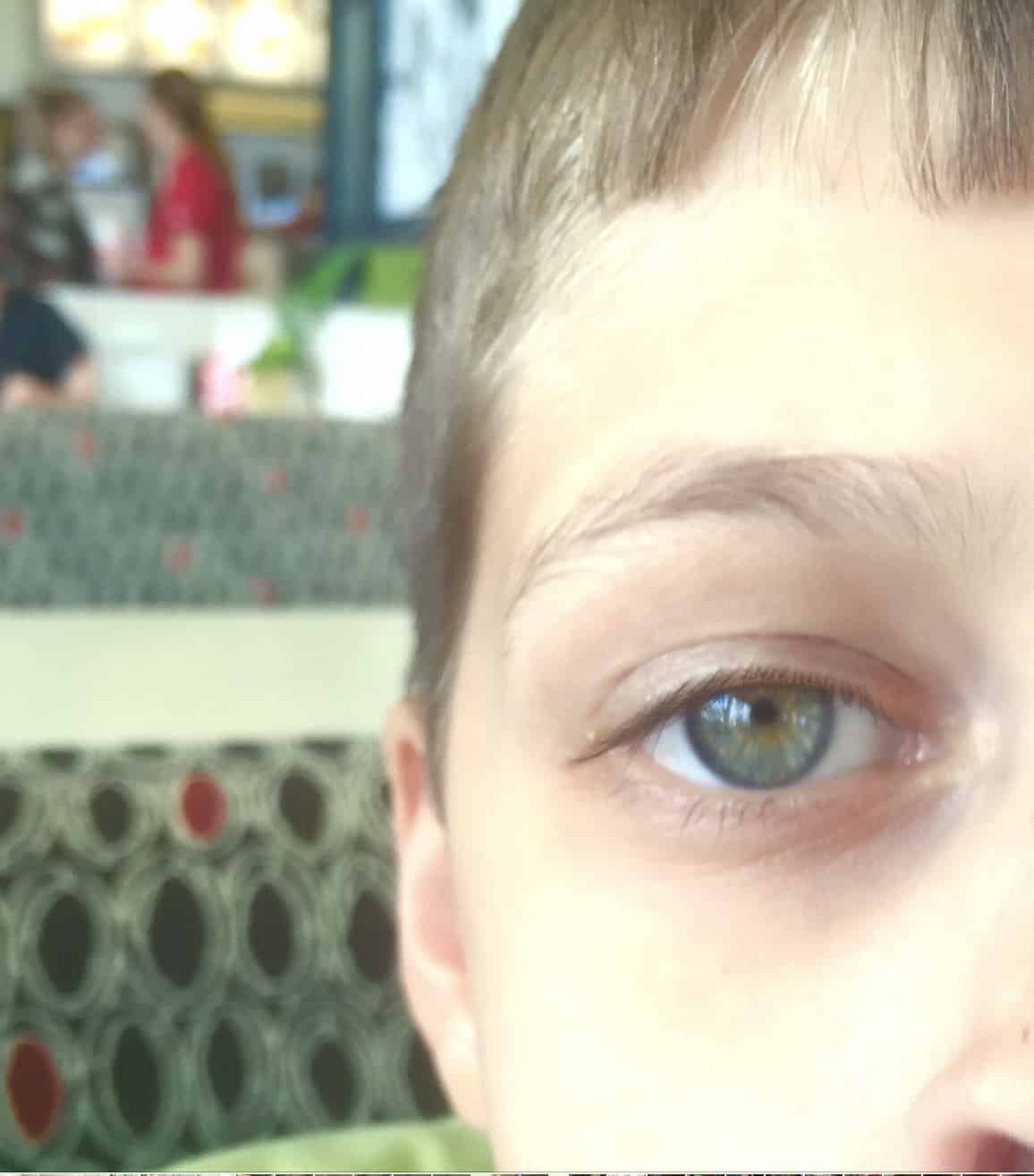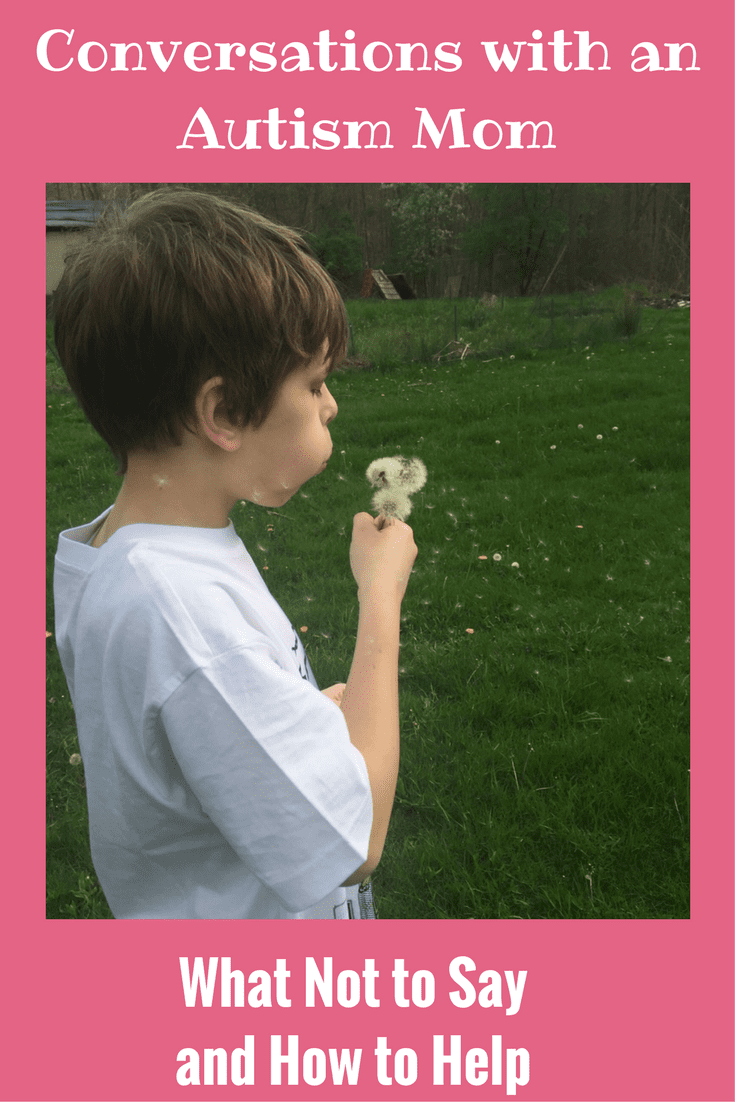Conversations With An Autism Mom
Are you someone who asks questions? Or do you just stay in your own lane and ignore most of what goes on around you? I am a person that loves connecting with others, so I ask lots of questions. However, sometimes my questions seem too personal for some people. In fact, in my striving for connection, I have crossed personal boundaries many times. Additionally, as an autism mom, I am always open to conversations about autism.
My youngest child is autistic. Everyone talks about autism, and we try to “raise awareness,” but we don’t talk about what to say or how to say things. Life is hard, and we need to encourage one another, and when you don’t understand a situation you may not be aware of how your words come across. As a person who asks lots of questions, I realize that my words aren’t always carefully chosen which may hurt others.

Conversations with an Autism Mom – What to Say and What Not to Say
As an autism mom, sometimes I feel like I have it all together, and sometimes I feel like I am hanging on by a thread. It is in those “hanging on by a thread moments” that I need an encouraging word. I have had very good friends say to me, “I thought you didn’t know that there was a problem, so I didn’t say anything,” or “I didn’t know what to say.” So I have put together a list of things I, and other autism moms, get asked, and ways to ask your questions that will help you understand without making the parent feel judged.
Don’t Say:
Shouldn’t he be (fill in the blanks) by now?
Yes, we get it. We know that he should be potty-trained or be talking or writing his name or be able to tell time. But guess what, he/she doesn’t. Because sometimes when a child has delays, this delays normal milestones. By pointing out my child’s delay, I hear you saying that I am somehow doing a bad job. And sometimes we actually hear from well-meaning relatives that we are doing a bad job. Maybe that is not your intent, but that is definitely what we hear.
Instead, Say:
(Child’s name) is talking better, has improved in some area, or some other complement of said child.
Sometimes it is hard to find something to compliment, and it seems like autistic children are “stuck” in a phase forever. Jack-Jack used to say the phrase, “Is it the one that was, or is it the one that wasn’t?” We didn’t even know what he meant by it, but we heard it hour after hour, day after day, month after month. We really couldn’t see past that stage, but having a friend or relative notice that he was getting better at something else was a blessing in our lives.

Don’t Say:
I could tell right away he was autistic
I hear this one often. Your neighbor’s cousin is autistic and does something similar to my child. When you say these words all I hear is that you see my child’s negative or odd behaviors. Please look past those things and see what a beautiful, wonderful person he really is.
Instead, Say:
Something the child does well.
I know that sometimes with all the touching (he touches everyone too much), jumping, and constant motion, it may be hard to find something, but sometimes as an autism mom, I cannot see the good. I need other people to find it for me.

Don’t Say:
Maybe you should keep him home until he gets through this stage.
Instead, say:
How can we help you make this experience better?
Offers of help say that there is hope. It also communicates that you care. Compassion and care are things most parents would appreciate, but autism parents need more than anything else. We don’t take care of ourselves, and we are so focused on our child that unless an act is overtly caring many times we miss it. Even if there is nothing that can be done, say, “How can we help?” What we hear is “we value you.”

Don’t say:
I work with an autistic child, so I understand.
When Jack-Jack was 12, he walked up while I was ironing a shirt in a hotel room. He looked at the iron, and I said, “That is hot. Do not touch.” He then walked over to the counter and eyed my curling iron. I said, “That is hot too. Do not touch.” And he promptly touched my curling iron and burned his hand. I was standing right there. I thought he understood hot, and that he would listen. So if I can’t understand what goes on in his brain, how can you possibly know?
Instead, Say:
Can you share some stories with me to help me understand better?
Many days autism moms are looking to have great conversations with friends. We are just so stressed we don’t even know how to connect with people. Picking up the phone to text or call can be so overwhelming. But if you want to hear stories, we would be glad to share with you.
Don’t Say:
You look tired
This is another one I hear frequently. I get it. I look like I don’t sleep much. Guess what? I don’t. In the movie, Elf, Wil Ferrell says he got a full 40 minutes of sleep. That is my life. NO matter what time Jack-Jack goes to bed or what he eats, or what he does before bedtime, or how much exercise he gets, he needs much less sleep than we do. So I look tired because I am tired. And no amount of make-up will cover that up. In fact, when you say to an autism mom that they look tired, what we hear is, “You look like crap.”
Many times we really don’t even know what we need, but just hearing those words seems to make me feel like I am a person. Because let’s face it, when you spend your waking hours taking care of other humans you sometimes forget to drink your coffee, eat, sleep, bathe and dress.
Don’t Say:
Did you see the article regarding…?
Yes, I did read it. I am sure I read it. The study that links low vitamin D to autism – Read It! Yes, my vitamin D levels were probably low when I was pregnant. The study that links autoimmune diseases in the mother with autism – Read It! Yes, I have an autoimmune disease. The study that says that autism risk rises with maternal age – Read it! Yes, I was 40 when I had Jack-Jack. Does knowing any of these things help me right now? Will it make me sleep better knowing that some research points to me as the cause? Because I really can’t do anything about it now.
Instead, Say:
I would love to get together with you. Can you meet for coffee?
It is difficult for me to visit your house because Jack-Jack is petrified of dogs and some cats. We have worked on this, and maybe someday we will actually get a dog, but that is not on the list of things I need to work on right now. But life is lonely for an autism mom and child. I know many moms would love some company once in a while, but sometimes going out one more time is exhausting. Or visiting a new place is hard for the child.
If you ask me if we can meet for coffee, I will probably invite you over, but years ago, I would be so reluctant to invite you into my house because I never knew what the day would be like. And this is one autism mom that would love to have good conversations with friends. Many days, I never see any humans outside of my family.
However, even if we can’t get together, knowing that someone thought of you makes life a little easier. If we have a conversation over coffee, you will probably find out that yes, I did read about that study and lack of Vitamin D.
Don’t say:
Your child seems high-functioning or low-functioning
This is one question that I do not mind because I think it is a perfect opportunity to help clear up some misconceptions. However, many parents seem to have a problem with it.
Basically I have no idea what these terms mean and I doubt most experts know. Jack-Jack is potty trained, feeds himself, and he can put his clothes on. He is high-functioning on the potty training scale, but at age 4 he was not. But life is not measured in just potty-training. He cannot tie shoes. He cannot tell time. He reads at a 2nd-grade level. So he is low-functioning in those areas. However, he is kind, caring and loving, so he is high-functioning in those areas. If your child isn’t as kind as Jack-Jack, should I label him low-functioning on the plays nice with others scale?
Instead, Say:
You are doing a great job
Let’s face it, raising children is a thankless job. Moms and dads don’t get awards for all they do at home. There is no “Best in Folding Laundry” category or making dinner, washing clothes, keeping things humming. Everybody notices when things aren’t running smoothly, and in a house with a special needs child, many times things don’t get done or slip through the cracks, because we are just basically surviving. Moms of all ages need to hear they are doing a great job.
Don’t Say:
Maybe he would be better with (insert special therapy)
Our family has opted not to do extensive therapies. We have lived with my son day-after-day, night-after-night for 15 years. I have some trusted advisers that I consult. We homeschool and believe that is what is best for Jack-Jack. Furthermore, Jack-Jack needs to have a basic level of trust to work with anyone. He trusts women more than men. He distrusts doctors and medical & therapy offices. So sometimes therapies do more harm than good.
Instead, Say:
How can I pray for you?
This is the most important thing a person can say to me. I believe in the power of prayer and believe that love and prayer cover a lot of ground. Not everyone will want prayers, but if you ask, it still communicates care in a way that many other words don’t.
Don’t Say:
Does your child have any talents?
Instead, Say:
I’m here to talk!
And really doesn’t everyone need a friend. So when you are having a conversation with an autism mom, you now have plenty to ask her!
Do you have any questions that you get asked? I would love to hear them!
To Read More About Jack-Jack – CLICK HERE The Funny Side of Autism

Reviewing movies for parents from a Christian perspective since 2005. Know Before You Go!
Christian Homeschooling mom – 30 years and counting
Autism Mom & Disney enthusiast





I came to visit via your Instagram post. Thanks for sharing these tips. Most helpful. It’s hard to think what to say sometimes so I try to make positive points. I’m sure a “he’s looking great” is miles more useful than a negative point. Keep up the great work too blogging and caring for your family.
Thank you for reading. I appreciate your kindness!